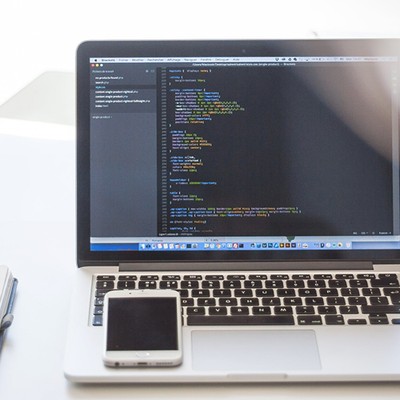
Why You Should Really Get Into Coding
It’s not only the number of female software developers on the decline – the total number of Brits entering into development roles has slipped by 16,000 in the past year. Despite our reliance on technology ever growing, this is the first time levels have dropped in ten years, and experts are concerned this will mean the UK won’t have a competitive edge in a post-Brexit world.
"Diversity can’t be an afterthought in digital economy,” warns Evgeny Shadchnev, CEO of London’s Makers Academy, adding that it’s “never too late to learn coding and consider a career switch”.
To address the falling numbers, Makers – originally a 12-week computer programming bootcamp – has now launched a free apprenticeship scheme alongside its original course, in an aim to help more people into software engineering careers. Funded by a £3m grant, the scheme largely focuses on getting women into coding, along with people over the age of 40, and guarantees attendees a job in the digital sector.
And it’s far from the only organisation striving to address the imbalanced tech sector. The trend for female-focused coding groups like #GirlsWhoCode have officially reached the UK, with the likes of Women Who Code and Code First: Girls inspiring the next generation of digital leaders.
One of the biggest purveyors of the movement this side of the pond is Kathryn Parsons MBE, Founder of Decoded – a Shoreditch start-up that’s now grown into the world’s leading tech educator; reaching more than 250,000 people in over 85 cities. Based on Parsons’ belief that anyone can learn the art of digital literacy, Decoded's signature course has trained those with no background in computers whatsoever to successfully code in just one day.
Top of her list is getting more women into her industry – “Technology is driving the future economy and it’s not good enough to accept that a lot of women opt out at a really early age.” – but she’s also passionate about life-long learning, encouraging employers to teach more skills on-the-job. “There’s a global need for digitally literate business leaders,” she says. “All boards should be able to say they’re 100% confident about the tech trends that are likely to affect their companies: big data, artificial intelligence, machine learning and cyber security. The employees of business are the economy, so business leaders need to take everyone on that journey with them, creating cultures that enable people to learn throughout their lives.”
Parsons is also the woman behind the successful campaign for code to be a mandatory part of the UK national curriculum for children aged seven and up – introduced to schools in 2015. It’s a subject in its very early days, and tech experts say they aren’t deterred by the recent statistics – to combat declining GCSE-uptake, the British Computer Society (BCS) has already announced it’s currently reviewing whether it will overhaul the current course in favour of a “broader qualification”.
Stating that she never thought simply making coding mandatory would solve the need for an “educational revolution” when it comes to tech in schools, Parsons has high hopes for the future. “Primary school children being exposed to something they might be phenomenal at,” she says. “I think that’s amazing.
So just how can we make coding seem more accessible – especially to young girls? Coding expert and supermodel Karlie Kloss, who has her own education non-profit Kode With Klossy, believes schools should take a two-pronged approach. By boosting the number of girls in coding classes, more young women will feel empowered to take them – “It’s about gaining the confidence to see yourself in an industry where there might not be a lot of people that look like you.” – but also by focusing more on how creative and applicable coding is to real life.
Parsons completely agrees: “It’s not to do with proficiency or ability. It’s absolutely to do with branding and how it’s taught and presented to women.” Essentially, coding lets you create and solve problems digitally, and as Parsons says, it’s therefore essential women are involved: “The benefit of being a female tech founder is you can establish a different culture and can change problems you want to change. If you put this powerful tool set in the hands of more women, more diverse problems would get solved and more businesses would get created to make the world a better place.”
DISCLAIMER: We endeavour to always credit the correct original source of every image we use. If you think a credit may be incorrect, please contact us at info@sheerluxe.com.































